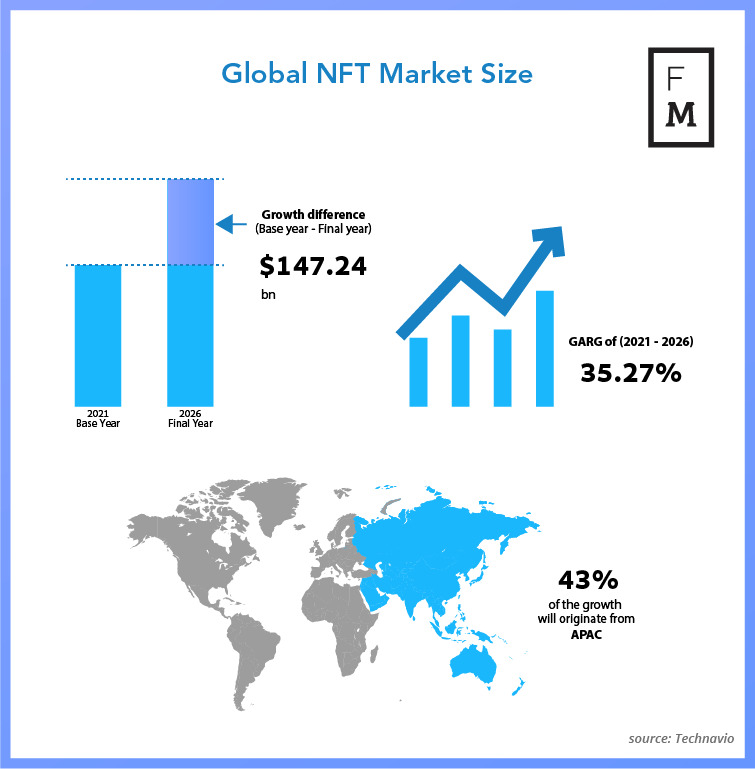The non-fungible tokens (NFTs) are here to stay; that is a fact. Thousands of users trade with NFTs around the world and take advantage of the pros that could bring these new kinds of assets that are brought by the emerging blockchain technology.
With auctions that cross $5 million per NFT on average, questions arise about the legal status of NFTs globally. This is because of the huge amount of money that is traded on each transaction made in each Bored Ape NFT or the first-ever tweet by Jack Dorsey that was auctioned off some time ago for $2.9 million.
Are NFTs regulated? Should they be regulated? These are questions that experts ask themselves every day and have no clear answer as of press time. This is especially since NFTs are an emerging trend despite their consolidation as an asset class.
Market Size
In 2021, according to EarthWeb, the NFT market was worth $41 billion. Also, there are between $10 and $20 million worth of NFTs sold in the blockchain every week, and over 50% of the sales are less than $200. But, the trends are optimistic. In fact, the NFT market size is forecasted to reach a whopping $130.35 billion by 2028.

With these figures in the table, what about the legal status in major hotspots like the US and the UK?
Status in the US
The US Securities and Exchange Commission defines a digital asset as “an asset that is issued and transferred using distributed ledger or blockchain technology.” However, it does not have a definition for non-fungible tokens.
Of course, the country’s authorities have been monitoring NFT-related transactions to explore how to regulate them or see if they fall under any regulation outlined in the country. These watchdogs are the US Treasury Financial Crimes Enforcement Network (FinCEN) and the US Commodities Futures Trading Commission (CFTC) and the Internal Revenue Service (IRS).
NFTs are not seen as securities in the United States. However, if they are marketed as an asset that will give a return on the investment, the law will play a role there and will consider the asset as a security.
What about the UK?
In the UK, the situation is similar: there is no regulation, and the authorities have been actively warning of the risks it possesses in money laundering and terror financing.
That said, in the eyes of the UK Financial Conduct Authority, there is no legal framework for NFT taxation as well.
Are NFTs a 'Fad'?
But, how do the experts perceive NFTs, and what do they think about the stance that a government should take in this regard? Kirill Suslov, the CEO at TabTrader BV, told Finance Magnates that NFTs could be just ‘a fad’.
“NFTs were actually created in 2014 and existed as colored coins on the Bitcoin blockchain. There was a dedicated Prism wallet that went belly up in 2018 because they never picked up back then. Now NFTs are just rebranded with a new word. But, essentially, they are fungible tokens, i.e. a token that is unique. One example could be a ticket, an airline ticket: it’s issued only to a traveler who paid for it and is not valid for everyone else,” he said.
About the regulatory’s topic, Suslov pointed out: “Governments could just assume a wait-and-see approach to regulation. If NFTs are here in a couple of years and are affecting a significant portion of retail investors, then there could be a draft regulation proposed by the industry participants already. Government bodies should just asses such initiatives and move accordingly.”
Marko Vidrih, the Co-Founder and COO at Niftify, told Finance Magnates that The European legislative proposal for a regulation on markets in crypto assets (MiCA) could offer a solution to this regulatory dilemma.
“Should the existing US and European laws be amended or the application of the regulations differentiated between different forms of NFT, [then] NFTs would be subject to a comprehensive application or approval process. That would no longer be proportionate to both issuers and retailers. (…) The term is defined very broadly so that a starting point for regulating NFTs would be laid. Accordingly, public offerings and trading of NFTs would be subject to special disclosure rules of information similar to the laws applicable to securities such as stocks and bonds. In addition, no approval is required so far, only notification to BaFin and inclusion in a European directory,” he said.
Moreover, he commented on the current legal framework’s stance: “The current legal framework only knows rules for financial instruments and securities, which, among other things, require they are generically standardized to be traded and generate a financial return. In the case of digital images in Jpeg format and music or video clips as NFTs, there should be no generic standardization precisely because of their uniqueness or exclusivity of a few pieces, and the achievement of a financial return should at least be questionable.”
Both experts agree that uncertainty is still there regarding granting a definition to NFTs on whether they are crypto assets that serve investment purposes or not. At least, in the case of the BaFin, Germany's financial market supervisory authority, has not yet issued a clarifying statement, Vidrih commented.
 financemagnates.com
financemagnates.com